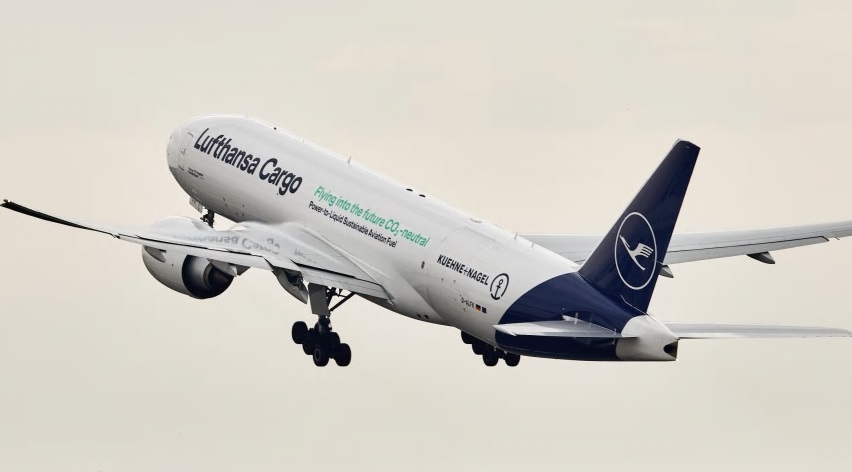Lufthansa holds hope for a “good year”
03 / 04 / 2023

Dorothea von Boxberg Credit: Lufthansa Cargo
Lufthansa Cargo is optimistic about its business prospects for this year with fleet and digitalisation investments continuing to shore up its growth goals.
“Lufthansa is back” declared chief executive Carsten Spohr as the German airline announced record group operating profits of €1.5bn for 2022, the biggest financial turnaround in the carrier’s history.
Lufthansa Cargo played its part by notching up a record result for the third time in a row as revenue rose by 22% to €4.6bn in 2022 and adjusted earnings before tax and interest edged ahead of 2021 to €1.6bn.
Spohr, who led the cargo business from 2007, said that Lufthansa Cargo is set to remain a “success story and a key pillar within the Lufthansa group”.
He added: “We expect our cargo business to make a further significant contribution to our results in 2023 and beyond.”
That is a clear vote of confidence for the Lufthansa Cargo team led by Dorothea von Boxberg, chairperson of the executive board and chief executive, and set to become the new chief executive of Lufthansa Group subsidiary Brussels Airlines in the middle of this month.
The airline’s board has approved an extra two Airbus A321 converted freighters for Lufthansa Cargo, doubling the short haul fleet aimed at the growing e-commerce sector.
Speaking to Air Cargo News, von Boxberg says that the new aircraft would go beyond the established trucking network in Europe, covering longer distance routes with water in between, such as Norway or Tunisia.
“This is e-commerce led. The reason we are ramping up is that we currently operate a combination of charter and scheduled services.
“Last year we had only one aircraft and with that you cannot offer a good enough service to an e-commerce company that needs reliable daily uplift.”
The carrier will also expand its long-haul Boeing B777 freighter fleet from 15 to 25 aircraft by 2030 with the arrival of three current generation B777Fs and seven next generation B777-8Fs, although the tail-end deliveries of the latter may be extended by up to two years as airframer Boeing fulfils order commitments for the B777-9X passenger model.
There are no plans yet for further freighter orders says von Boxberg, but added that it would make sense to consider a decision closer to 2030.
Digitalisation leader
Spohr also told an investor results webinar that Lufthansa Cargo has “consistently digitalised its sales and handling processes more than any of its competitors”.
He added: “Our cargo business is acknowledged and appreciated worldwide for its specialist expertise, particularly in the field of complex transport such as temperature-sensitive pharmaceuticals.
“It is a strong-growing market with specific know-how where maximum reliability is essential.”
Von Boxberg makes it clear that she has been building on the hard work of her predecessors in digitalising the air cargo supply chain.
The idea is to eliminate data errors and to have digital information available earlier for the regulatory authorities to decide if inspections are necessary, and in general to provide customers with transparency in the supply chain.
However, von Boxberg and her team acknowledge that there is still a lot of efficiency to be gained by better digital services, both in sales and cargo handling: “There is still a lot to be done, but why are we at the forefront? That is because for 15 years customers have been able to make online bookings with us and since then we have continuously worked on improving our digital offer.
“We are capturing data from our customers in advance of delivering freight so that the dataflow is ahead of the physical shipment flow. We get air waybill data and check it upfront so that we can avoid situations where a truck arrives on a Thursday night to deliver freight and the shipment cannot be accepted.”
The war in Ukraine has seen European-based airlines avoid Russian airspace and the resulting additional fuel burn must be absorbed at a time of rising energy costs.
Lufthansa Cargo estimates that the airspace diversions around Russia, cost the airline around 10% of its operating capacity in 2022, but that is true for most of its European competitors, although China-based companies can transit Russian airspace.

Boeing 777 freighter with SAF livery. Photo: Lufthansa Cargo
Scaling up SAF
Sustainability is a key concern for all carriers and the challenge is to allow greater use of Sustainable Aviation Fuel (SAF) both in terms of regulatory approval and the build-up in SAF production to practical levels.
SAF accounted for 2% of Lufthansa Cargo fuel usage last year, which does not sound much but was more than many other airlines have achieved, said von Boxberg.
But the pathway towards greater use of SAF has three limitations at present.
“The industry needs a lot of scaling up. SAF is not yet available in large enough quantities. Aircraft are not yet certified for more than 50% of SAF [per flight] and thirdly it is really expensive, so you could not afford to buy large quantities of it.”
The Lufthansa Cargo chief reasons that scaling up SAF production worldwide will mean a reduction in the fuel price which will see more SAF pumped into freighter fuel tanks.
Von Boxberg would like a consistent global regulatory framework around SAF application, rather than piecemeal regional variants.
Asked if that worldwide SAF level playing field will arrive soon, the normally upbeat chief executive answers: “No, I’m not overoptimistic.”
What does this year hold?
Asked for a forecast summary for 2023, von Boxberg says: “It will be a more normal year compared with the extraordinary years of 2021 and 2022, where there were so many supply chain disruptions and so little airfreight capacity available.
“This year will be more normal, but I see no signs that we will go back to pre-pandemic levels in 2023, but from what we have from our own figures and what we hear from forwarders and from short-term forecasts like the Purchasing Managers Index (PMI) and so on, I think it will be a good year.”
Von Boxberg looks ahead to the fiscal year of 2023 “with confidence” in a sector that remains dynamic although specialist consultants predict what amounts to zero growth for the global airfreight market.
“My assumption is that 2023 will be a lot better than pre-pandemic but clearly not on the same level as the last two years.”
China will be “fairly decisive” in what happens this year, says von Boxberg, quoting a Chinese PMI of 52 points, the highest since 2012: “China is a very strong export country, but the next question is: will the Europeans, our main market, be buying? I think there are some good chances they will.”
The US-China trade war and the Covid lockdowns across China saw the development of the China + 1 business strategy of investing in other Asian countries to mitigate supply chain problems if China export production and logistics are severely constrained.
“The China +1 philosophy is taking place, of course not for all companies, but we see the result of investments in Vietnam and India, which is certainly benefiting, but also in other Southeast Asia countries,” says von Boxberg.
“We have just added two more frequencies to Vietnam, down to Hanoi and on top of our [Ho Chi Minh] services because we see what is developing there.”
She believes that China + 1 will see a gradual shift of investment and not a “Big Bang from one year to another for airfreight”, but Lufthansa Cargo will follow those changing Asian export flows with suitable frequencies from its expanding freighter fleet and network.
Ocean shipping woes
The pandemic wrought havoc with containerised ocean freight sailing schedules as key ports like Shanghai suffered lockdowns and Chinese exports plunged.
The result was a significant modal shift from sea to air which is now reversing.
The Lufthansa Cargo boss said that the shift back to ocean freight was already apparent from the second half of last year and will continue as shipping line schedules, container equipment supplies and port operations become more reliable.
“Freight that went to air cargo did so because of the distortions in ocean freight side, but a lot of that reverse effect, going back to [the ocean freight sector] has already happened.”
And while there are some commodities, such as pharmaceuticals and e-commerce, growing sectors best served by the immediacy of air cargo, there are still lessons from history.
“If you think back to laptops, 2017 was the year when, for the first time, half of them were flown and half of them were already on ships.
“For many commodities, if you are very new and innovative, shippers start with airfreight and then move on to ocean freight. We have seen that lots of times.”
Another result of Covid and the mad rush for reliable airfreight capacity was the emergence of in-house freighter networks established by freight forwarders. The current debate is whether forwarders will continue these networks as passenger bellyhold capacity starts to increase.
For example, Lufthansa’s strong growth in the belly segment continues and now accounts for around half of Lufthansa Cargo’s transport capacities.
In the 2023 summer flight schedule alone, cargo will be transported on more than 7,000 flights a week operated by Lufthansa and its group subsidiaries: Austrian Airlines, Brussels Airlines, Eurowings Discover and SunExpress.
Forwarders turning to secured capacity during a crisis is not new but the idea of them maintaining a network beyond a supply chain obstacle course is interesting.
Said von Boxberg: “I always wonder why freight forwarders are chartering so much capacity. Right now, they have invested a lot into the fixed capacity and during pandemic times they were happy about it.
“This has happened a number of times before, because in the good times you can charter aircraft and when the boomtime ends you figure out that is maybe not so easy to fill freight capacity profitably.
“There is a certain skill set in doing that which is why there are forwarders and airlines as separate companies.”
The chartering of fixed capacity by some freight forwarders has not affected the close relationship with airlines, but there does seem to be a new perspective in how forwarders view having their own network, in addition to the freighter and bellyhold space they still buy from airlines such as Lufthansa Cargo.
Will these forwarder networks continue for the longer term?
“I personally don’t think it is realistic. Assuming that you made a three-year contract two years ago, they [the forwarders] would probably still tell you that it is a good idea but let us wait a little longer to see if these contracts continue. I would have my doubts.”
Lufthansa Cargo reports third year of record operating profits














